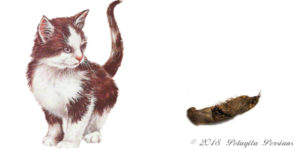Hairballs - The Midnight Gift

© Pelaqita Persians
"Ack, Ack, Ack." We all know that sound. It is the distinctive sound a cat makes as it coughs up a hairball. Even in the middle of the night when you are fast asleep it is a noise that almost always will pop open your eyes. It is a sound that is guaranteed to make an owner bounce out of bed to scoop up that awful lump of wet, matted fur before they accidentally step on it in bare feet (and let's all admit it here and now, we all have done that in the middle of the night).
Hairballs Can Be Lethal in Cats
Hairballs – The Cause
Cats spend much of their time grooming themselves which leads to their swallowing their own fur. Cat fur is not easily digestible. However, normally most of the swallowed hair passes through the cat's digestive tract and out in the stool.
The problem develops when the undigested fur collects in the cat's stomach or digestive tract and forms a ball that cannot be passed. This ball of hair is then vomited up as a hairball. A hairball is a tight, elongated cylinder of packed fur which sometimes includes bits of food.
Impaction - Lethal
A hairball is usually vomited up in one or two tries. A serious problem can develop if a hairball cannot be vomited up or passed.
If the ingested hair combines with undigested food in the stomach or intestinal tract it may become impacted. Many times, impaction which will require surgical intervention. Sometimes impaction causes painful constipation.
Hairball Symptoms
You find (as in you step on it) a cylindrical, furry, cigar-shaped "thing" on the floor! Long before you find a hairball, there are other signs that can point towards a potential problem.
- Repeated retching or hacking with little or no result, particularly after meals
- Constipation
- Hard stools with hair showing within them
- Diarrhea
- Swollen abdomen
- Dry, matted coat
- Loss of appetite
- Depression of lethargy
Virtually all cats have hairballs at some point in their lives.
Hairball Treatment
Commercial Hairball Remedies
Products on the market that can help cats with a hairball problem are usually composed of non-digestible oil-type ingredients and are flavored so a cat will accept them. They work by lubricating the cat's digestive tract to help the hair pass more easily. If this is done routinely large mats or balls never form.
These come in various forms, including pastes, gels and granules that are sprinkled on food. They provide assistance in passing hairballs through lubricating action or by providing soft bulk, or a combination of both.
Important Warning Note: Many hairball remedies contain mineral oil. Taken in quantity, mineral oil can deplete the body of vitamin A. You may need to give your cat a vitamin A supplement if using a commercial hairball product. Check with your veterinarian.
- Commercial remedies taste good and are very effective, but always read and follow label directions carefully.
- Never give any hairball remedy as a daily part of the cat's diet or for more than four or five days in a row, unless specifically recommended by your veterinarian.
- Make sure to follow the manufacturer's recommendations for use
Homemade Hairball Remedies
Some cat owners prefer to use homemade remedies for hairballs. These include:
- A ½ teaspoon of melted butter two or three times a week.
- A teaspoon of canned pumpkin (non-flavored) or baby food squash. Cats generally enjoy these extra "treats," and they may help by adding lubrication or soft bulk to help hairballs pass. The pumpkin or squash are also sometimes used to help with constipation or diarrhea, because of their added fiber.
- A small dollop of petroleum jelly applied to the gum area on one side of the cat's mouth. I use this – if started early, the cats do not mind the taste at all and some even like it
Prevention

Two Persians with a Lion Cut © Pelaqita Persians
Most hairball remedies involve feeding "slippery" substances that will help the passage of hair and digestive waste move through the intestinal tract.
However, there are several other things you can do to reduce the possibility of your cat developing hairballs:
- More Combing: Regular grooming, even just a little bit every few days, removes the loose hairs that cause hairballs.
- Shaving: We shave our Persian cats down into what is known as a "lion cut".
- Bathing: Frequent baths loosens the hair and it washes down the drain, reducing the amount of hair that could be ingested.
- Vacuuming: Some cats learn to enjoy being vacuumed with the small brush attachment. This sucks off all those loose hairs!
- Higher Fiber Diet: A high-fiber diet or fiber supplement may also help with a chronic hairball problem. The fiber can help move the excess hair through the cat's digestive system and into the litter pan.
- Exercise: A hairball is a problem because it just sits there. Unless you get your cat's system moving a little more vigorously, hair will continue to collect, form hairballs, and be thrown up on your best rug or next to the bed for you to find with your bare feet in the middle of the night.
Cats At Risk
All cats can develop hairballs, but some cats are at greater risk:
- Cats with long hair or thick/plush coats;
- During shedding season;
- Cats that groom other cats; and
- Cats that are seldom combed.
